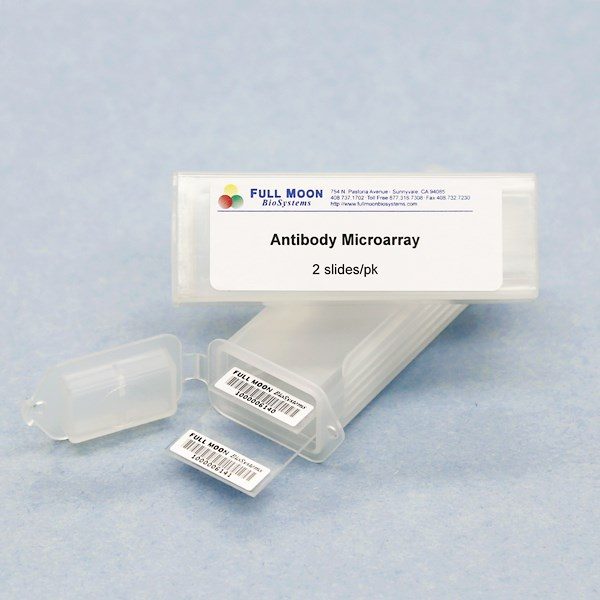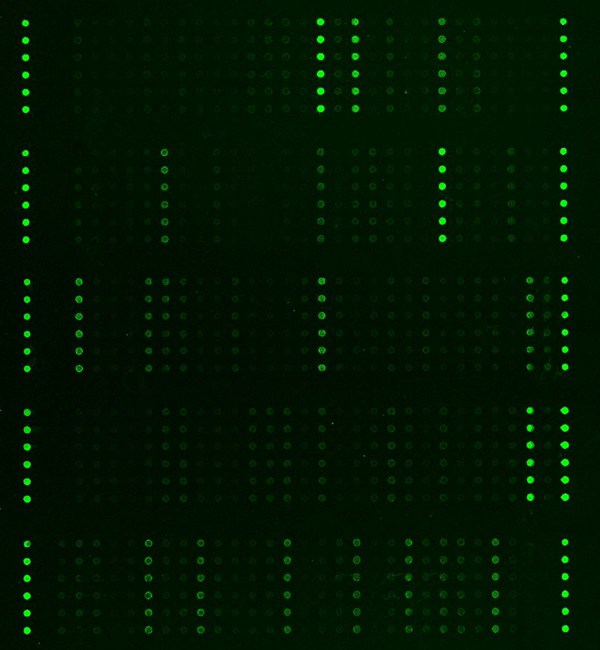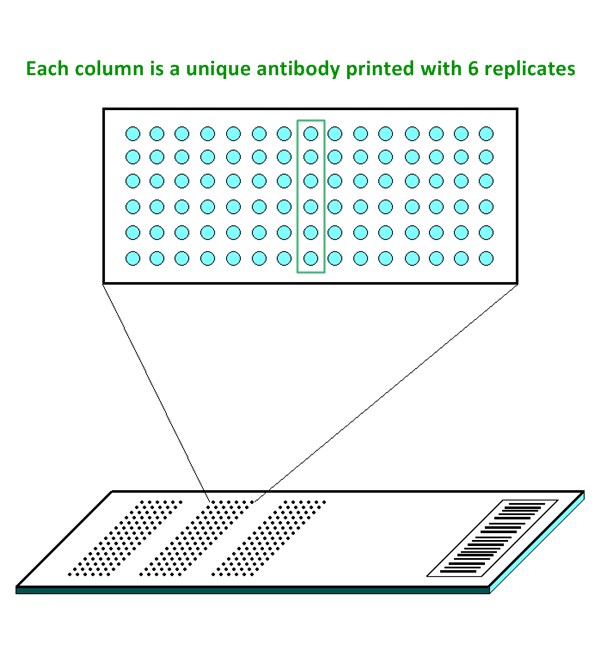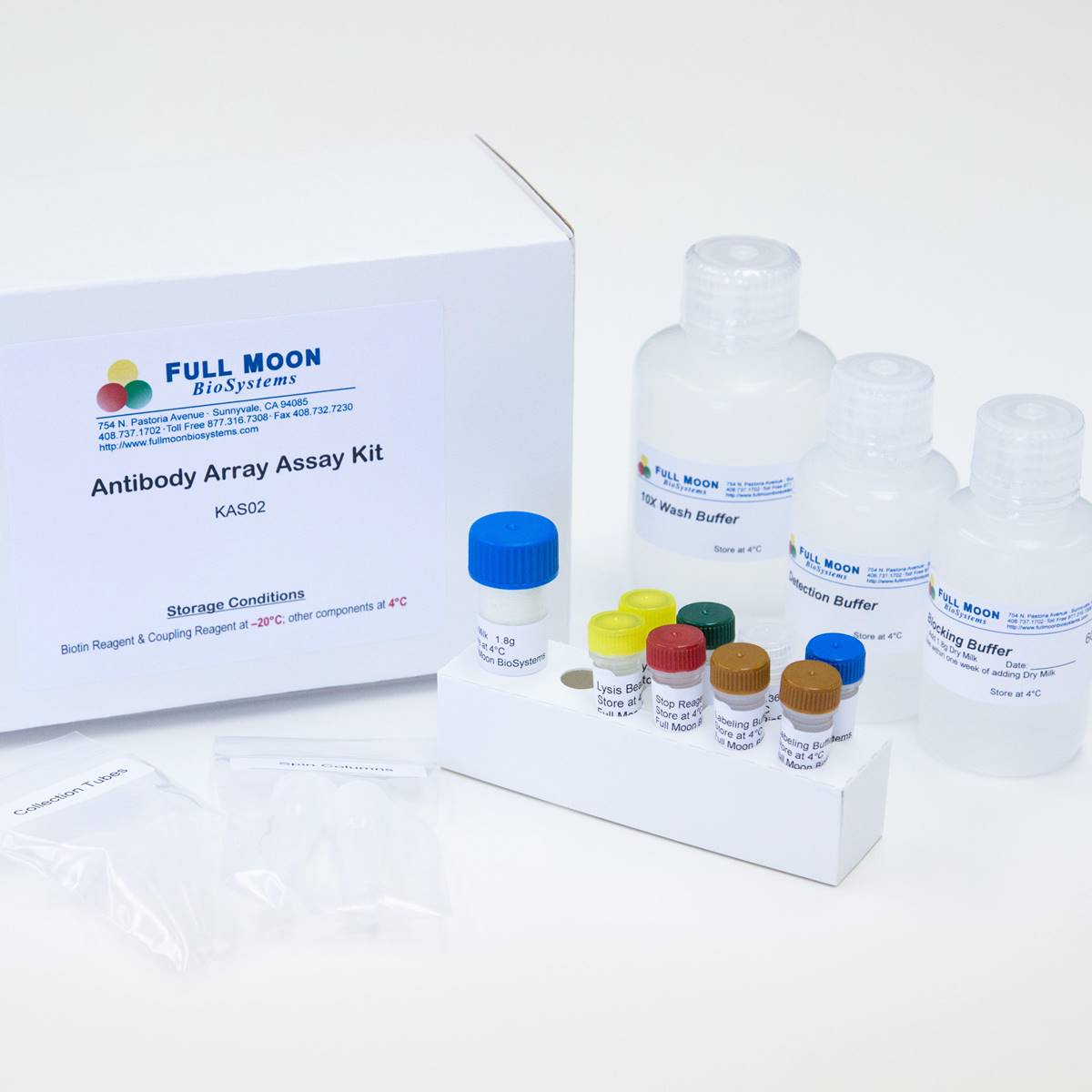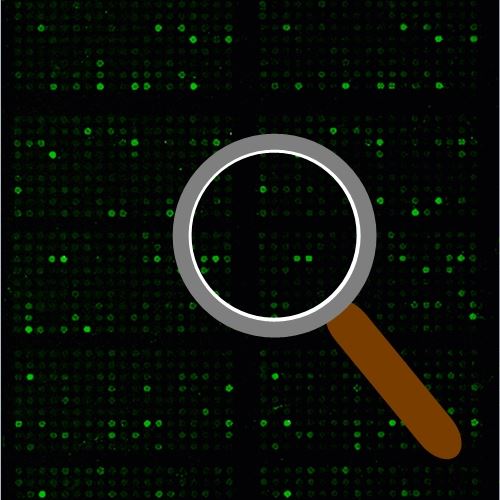AMPK Signaling Phospho Antibody Array
AMPK Signaling Phospho Antibody Array is a high-throughput ELISA based antibody array for qualitative protein phosphorylation profiling. The array is designed for comparing normal samples to treated or diseased samples, and identifying candidate biomarkers. This array features site-specific and phospho-specific antibodies, allowing researchers to study tyrosine phosphorylation and serine/threonine phosphorylation at specific sites.
Key Features
- Site-specific phosphorylation profiling and screening with 174 antibodies
- Antibodies covalently immobilized on 3D polymer coated glass slide
- Fluorescent detection
Specifications
| Product Size: | 2 array slides per package for two samples (untreated vs. treated) |
| Featured Antibodies: | 174 site-specific and phospho-specific antibodies |
| Reactivity: | Human: 100% | Mouse: 89% | Rat: 77% |
| Suitable Sample Type: | Cell lysate | Tissue lysate |
| Detection Method: | Fluorescence | Compatible Scanners |
| Internal Controls: | Positive controls: beta-actin | GAPDH | Negative controls |
| Slide dimensions: | 76 x 25 x 1 mm |
| Storage Condition: | 4°C for 6 months |
Product Details
4E-BP1 (Ser65), 4E-BP1 (Thr36), 4E-BP1 (Thr45), 4E-BP1 (Thr70), ACC1 (Ser79), ACC1 (Ser80), AKT (Ser473), AKT (Thr308), AKT (Tyr326), AKT1 (Ser124), AKT1 (Ser246), AKT1 (Thr450), AKT1 (Thr72), AKT1 (Tyr474), AKT1/2/3, AKT1S1 (Thr246), AKT2 (Ser474), AMPK1 (Thr174), AMPK1/AMPK2 (Ser485/491), AMPKbeta1 (Ser182), CaMK1-alpha (Thr177), CaMK1-beta, CaMK2 (Thr305), CaMK2 (Thr286), CaMK2-b/g/d (Thr287), CaMK4 (Thr196/200), CAMK5, Cyclin A1, Cyclin B1 (Ser126), Cyclin B1 (Ser147), EEF2 (Thr56), eEF2K (Ser366), eNOS (Ser1177), eNOS (Ser615), eNOS (Thr495), Fas ligand, HMG14, HMG20B, HMGB1, HMGB2, HNF4a (Ser304), HNF4a/g, HSF1 (Ser303), HSL (Ser552/563), HSL (Ser554), LKB1 (Ser428), LKB1 (Thr189), MEF2A (Ser408), MEF2A (Thr312), MEF2A (Thr319), MEF2B, MEF2C (Ser396), MEF2D (Ser444), mTOR (Ser2448), mTOR (Ser2481), mTOR (Thr2446), p21Cip1 (Thr145), p53 (Ser6), p53 (Ser9), p53 (Ser15), p53 (Ser20), p53 (Ser33), p53 (Ser37), p53 (Ser46), p53 (Ser315), p53 (Ser366), p53 (Ser378), p53 (Ser392), p53 (Thr18), p53 (Thr81), p70S6K (Ser371), p70S6K (Ser411), p70S6K (Ser418), p70S6K (Ser424), p70S6K (Thr229), p70S6K (Thr389), p70S6k (Thr421), p70S6K-beta (Ser423), PFKFB2 (Ser483), PI3K-p85-alpha (Tyr607), PI3K-p85-a/g (Tyr467/199), PKA CAT (Thr197), PKA-R2B (Ser113), PLC-beta (Ser1105), PLC-beta3 (Ser537), RapGEF1 (Tyr504), SREBP-1 (Ser439), Tuberin (Ser939), Tuberin (Thr1462)
The ELISA based AMPK Pathway Phospho Antibody Array platform involves four major steps:
- Protein extraction with non-denaturing lysis buffer
- Biotinylation of protein samples
- Incubation of labeled samples with antibody array
- Detection by dye conjugated streptavidin
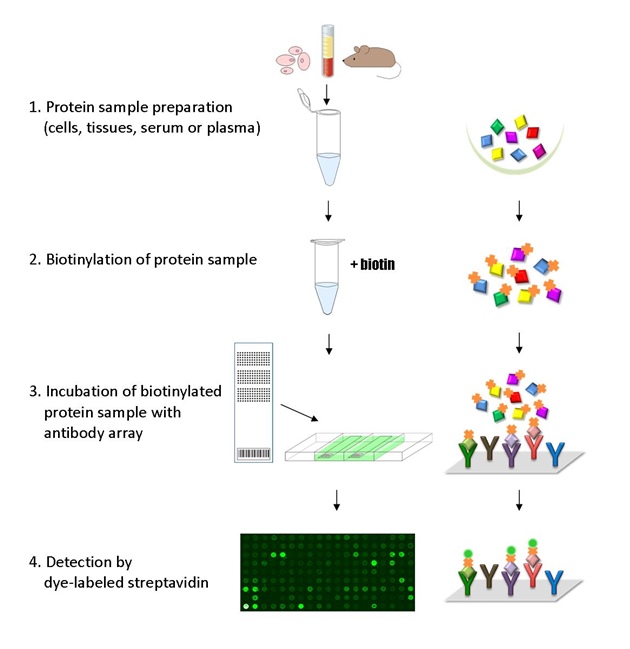
![]() GAL File (To download, right click on the file name, then choose “Save target as”)
GAL File (To download, right click on the file name, then choose “Save target as”)
Chan O, Burke, JB, The chemokine CCL5 regulates glucose uptake and AMPK signaling in activated T cells to facilitate chemotaxis, J Biol Chem 2012, 287:29406-29416
Pourshafie N, Masati E, Neuromedin U (NMU) regulates osteoblast differentiation and activity, JCI Insight. 2020;5(13):e136539
Zhang Q, de Mejia EG, Protocatechuic acid attenuates adipogenesis-induced inflammation and mitochondrial dysfunction in 3T3-L1 adipocytes by regulation of AMPK pathway, J Funct Foods, 2020, 69:103972
Services
If you don’t have access to a microarray, send the finished arrays to our lab for scanning. Raw scan images are delivered in tiff format.
Cost: Free
Array Image Quantification and Analysis Service includes data extraction, data organization and analysis of the array images obtained through our array scanning service.
Cost: $200 per slide
Complete Antibody Array Assay Service allows investigators to send research samples to our laboratory for analysis. There is no need to purchase the arrays and reagents and running the assays yourself. Simply select the array of your choice, and then send off the samples to our lab. This convenient hands-off approach offers quick turnaround and reliable results, saving you valuable time and resources. All assays will be performed by our highly trained scientists at our headquarter in Sunnyvale, California. Results are delivered by email in 1-3 weeks.
Cost: $1,470 per sample

